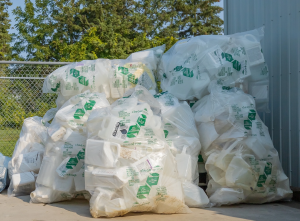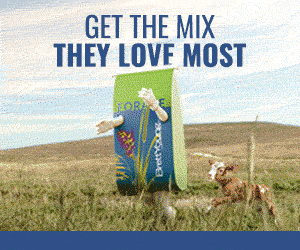AB Direct - Steers
Rail: ---
AB Direct - Heifers
Rail: ---
US Trade- Steers
Rail: ---
US Trade - Heifers
Rail: ---
Canadian Dollar
0.31

Alberta municipalities passing torch – chem container recycling moving to ag retailers
Recycling agricultural plastic pesticide and fertilizer containers 23L and under – a familiar practice to many Alberta farmers – is being updated.

At the request of the Agricultural Service Boards (ASB) that have been offering jug collection services in Alberta, Cleanfarms is moving recycling collection locations from municipalities to local ag retailers. The process is being phased in throughout the province over three years. Using ag retailers as recycling collection depots is already in place for empty 23L to 1000L pesticide and fertilizer drums and totes.
“Our plan is to have every ag retailer that sells crop inputs in under 23 litre containers accept those empty jugs to ensure farmers have the same or better access to recycling them,” says Barry Friesen, Executive Director of Cleanfarms. “Farmers will be able to return empty jugs to the point of purchase, which makes sense since they visit those locations multiple times a year.”
Updating the recycling collection process in Alberta started in 2022 following a request from the ASBs to Alberta Environment and Protected Areas (AEPA) and Cleanfarms to transition the 23L and under empty container recycling program from municipal depots.
The gradual process of moving away from municipal transfer stations and landfills began in mid-2022 with municipal collection sites that historically had no or low collection rates. More municipal locations will close their collection sites this year, as ag retailer collection sites open up. The entire update process will be completed by the end of 2024.
Cleanfarms’ contractors will pick up containers from both ag-retailers and municipalities throughout the phase-in period. The transition schedule, including the list of municipal transfer stations and landfills that will no longer accept empty jugs, is available on the Cleanfarms website. The website provides essential information for growers looking to drop off their plastic jugs for recycling.
In spring 2023, before farmers return empty jugs, they are encouraged to call their local ag retailer to ask if they have begun accepting empty containers for recycling.
The new collection structure brings a host of benefits, including a harmonized container collection system across the country. Alberta and Manitoba are the only provinces that have used municipal depots for plastic jug collection. In all other provinces, collection sites are at ag retailers, which are a regular stop for most farmers.
The streamlined system of retail, return, and recycling also simplifies essential activities for farmers. They can pick up Cleanfarms plastic collection bags for containers when they purchase crop inputs or drop off empties. The bags are free of charge and are commonly used to make container collection, storage, and drop-off more convenient and efficient. Additionally, the consolidation of what was once a dispersed chain of responsibility has made new services accessible, such as on-farm pickup for high-volume generators of empty pesticide and fertilizer containers.
Alberta farmers’ commitment to protecting their farmland and the environment, coupled with the crop input industry’s stewardship of empty containers, was the genesis of the now 34-year-long ‘containers up to 23L’ recycling program. In fact, the collection program started in Alberta and is now Canada-wide. Today, the collection rate of 23L and smaller jugs is an average of 77 per cent. Cleanfarms’ goal is to achieve a recovery rate of 100 per cent so the empty containers can be recycled into new plastic products.
Alberta farmers’ participation in this program has been crucial to its increased stability and success over the years and has set the stage for continued progress. A key part of that progress is establishing the right system of operations to ensure the containers are being collected as conveniently, sustainably, and affordably as possible.
Cleanfarms and the Alberta Agricultural Plastics Recycling Group (APRG) are publishing a series of information articles for Alberta farmers to develop a shared understanding of the importance of used agricultural plastics resource management.
A common theme throughout this monthly series is an exploration of how ag plastics, once used, can be recycled to reclaim the natural resources and the invested energy, returning them to the economy where they can be remanufactured into new products.
This practice is important to Alberta farmers because it contributes to agricultural sustainability that begins and ends on the farm, providing stewardship for future generations, as well as environmental health. Future articles will feature discussions on change management such as first sellers and manufacturers taking responsibility for used materials (extended producer responsibility), and explore practical recycling, including opportunities and challenges, for products such as grain bags, silage and bale wrap and baler twine that have real-time applications for farmers.
Cleanfarms is operating a three-year pilot project for grain bag and baler twine recycling in Alberta. The project is led by the multi-stakeholder APRG. Funds were granted by the Government of Alberta and are being administered by Alberta Beef Producers.
Find out more:

